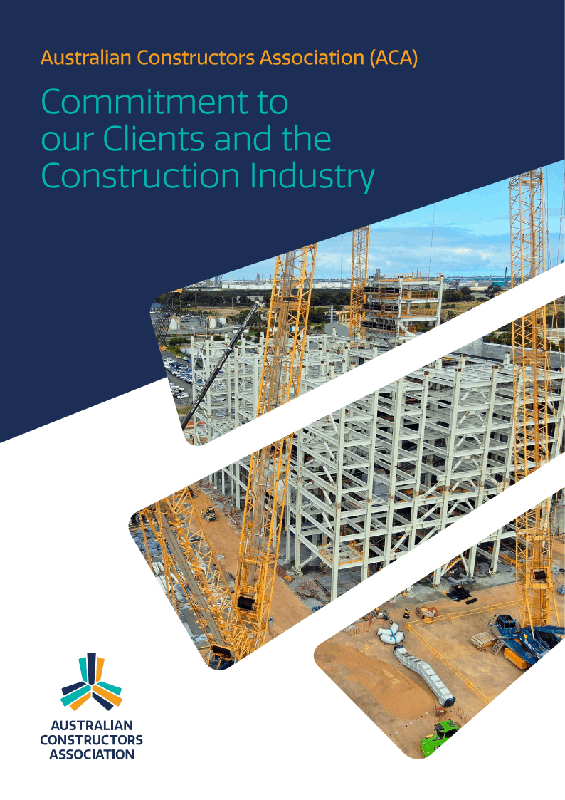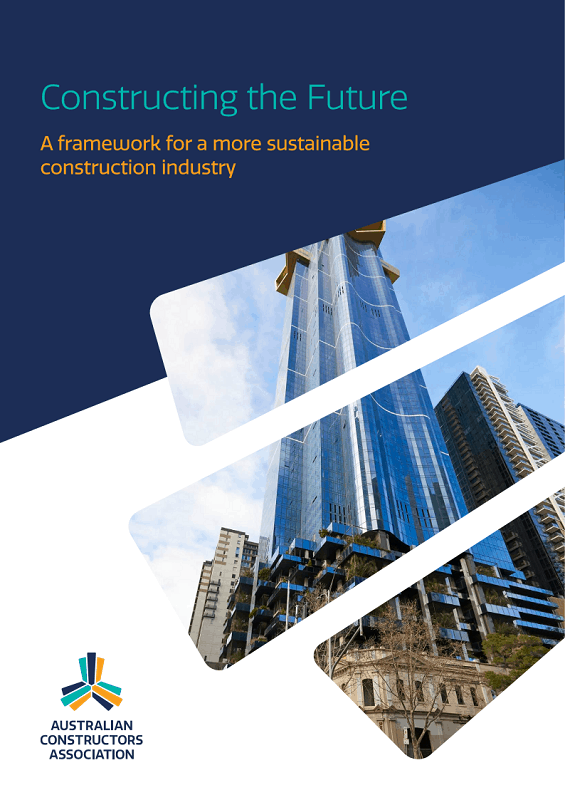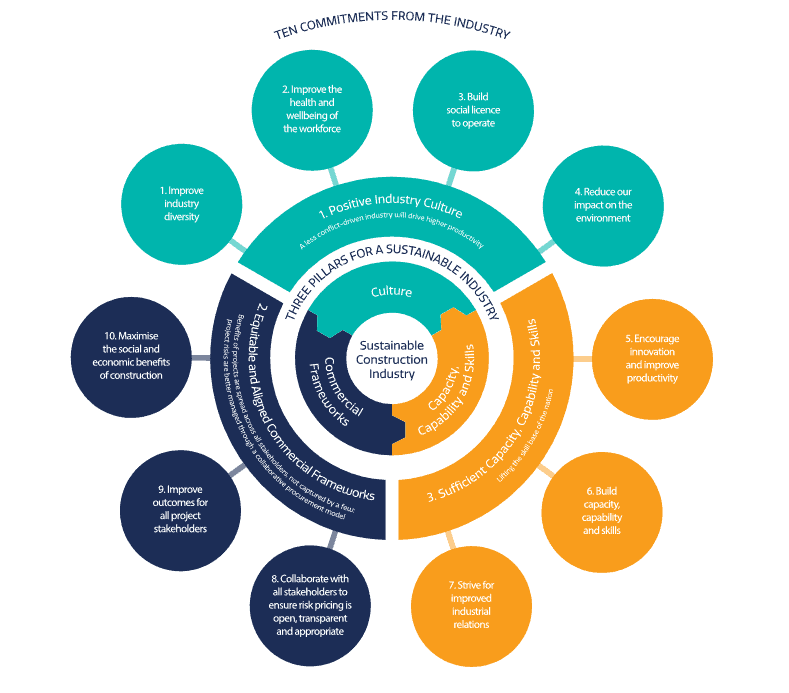ACA LAUNCHES FIRST-EVER NATIONAL CONSTRUCTION INDUSTRY CHARTER TO SPEARHEAD REFORM
Posted: 12th October 2020
Posted in: ACA News

Posted: 12th October 2020
Posted in: ACA News
The Australian Constructors Association (ACA) has today launched a ground-breaking Australian Construction Industry Charter to spearhead much-needed industry reform to help ensure stimulus projects are delivered efficiently and their benefits shared and maximised.
The Charter’s ten commitments to reform embraced by Australia’s leading construction and infrastructure contracting companies include improving industry culture by addressing matters such as worker health and well-being, working more closely with clients to improve project outcomes, nurturing the supply chain and increasing female participation. ACA Chief Executive Officer Jon Davies said, “Recognising the reliance being placed on it by Government to lead the economy out of recession, our industry has stepped up to the plate.
“We need to be transparent and accountable to our clients while maximising the social and economic benefits of our sector which employs 10 per cent of the total workforce.
“In an industry first, we have clearly identified the key elements required to improve the poor sustainability of our sector and effectively deliver the pipeline of stimulus projects. We have also developed our own Charter to ensure we are able to achieve lasting positive change and set the industry up for future success.
“We are launching this Charter on the second anniversary of the NSW Government’s 10 Point Commitment to the Construction Sector, an important step that we now match and raise the bar on.”
All ACA members have pledged to conduct their operations in a manner that adheres to the 10 commitments outlined in the Charter.
“Definitive targets to achieve these commitments will be set over the next few months with progress openly and transparently monitored and reported on a regular basis,” Mr Davies said.

Click HERE to download The Charter
The Charter has been developed alongside a Framework for a More Sustainable Construction Industry which sets out the ACA’s recommended focus areas for industry reform. The Framework identifies three key pillars for a sustainable construction industry:
“We see these pillars as being intrinsically linked, with the ability to achieve improved outcomes for any of these pillars reliant on improvements in the other two. For example, it is widely understood that adversarial commercial frameworks negatively impact on the culture of the industry and industry culture is a key factor in attracting people into the industry.
“With the additional investment in new infrastructure outlined in the Federal Budget being conditional on ‘using it or losing it’ there is a real opportunity for industry and governments to adopt a more collaborative approach to project procurement and delivery to address the lack of truly ‘shovel ready’ projects across Australia,” Mr Davies said.

Click HERE to download the Framework

All participants should be aligned on achieving the same project goals and appropriately reimbursed for accomplishing them.
We commit to openly and transparently working with our Clients and industry partners to better define desired project outcomes and to identify the most appropriate procurement and commercial frameworks that will align all stakeholders’ interests to achieve them.
The supply chain of the construction industry is made up of many thousands of businesses from owner-operators to multinationals.
We recognise our responsibility to protect and nurture the supply chain and we commit to treating our suppliers as trusted partners.
Where possible, we will prioritise procurement from local suppliers as well as social and indigenous enterprise to maximise the economic and social benefits of the projects we construct.
We recognise that the culture of our industry affects everything that we do.
We strongly believe that improved diversity, particularly gender diversity, will have a profound and positive impact on the culture of our industry, our interaction with key stakeholders and the success of our businesses and projects.
We commit to creating a more diverse workforce by identifying and removing the current barriers to diversity and to proactively improving the attractiveness of the industry to our future employees.
We acknowledge that the health, and safety of the workforce, supply chain and the community are paramount. We also recognise that a sustainable industry is one in which the longer-term wellbeing of the workforce is understood, managed, and continuously improved.
We commit to proactively work together, sharing best practice across our industry to ensure we are all operating at the highest health and safety standard.
We will also work together to collectively understand the effects of our workplace culture, environment and relationships on the mental and physical health of our workforce.
Our industry employs a large number of skilled and unskilled workers in the construction of productivity-enhancing infrastructure, playing a critical role in the health and prosperity of Australia and its citizens.
We will strive to improve both the retention of employees and permanency of employment so that as well as being an important industry for Government, construction is an attractive industry for employees with in-built capability to develop our people and equip them with critical skills.
Construction of new infrastructure can have significant positive and negative impacts on communities. We recognise our role to minimise the negatives, maximise the positives and to keep communities informed and involved as important project stakeholders.
We commit to improving social outcomes through the engagement of social and indigenous enterprises and will provide employment opportunities to those that have been displaced or are disadvantaged.
We commit to celebrating success and better communicating the significant positive social and economic benefits our industry generates.
We recognise that climate change is a growing concern for our workforce and the society in which we operate.
Construction of new projects has a significant impact on the environment and, whilst some impact is inevitable, there is much that can be done to reduce our footprint on the environment.
We commit to reducing carbon emissions from our activities, increasing the amount we recycle and reduce the amount we waste.
Our workforce is our most important asset and harmonious industrial relations are vital for
project success.
We commit to improved engagement with our workforce and those that represent them.
We commit to the creation of stable employment opportunities that allow for flexible working in an inclusive and safe environment.
We acknowledge that opportunities exist to significantly improve construction productivity.
We commit to working with our partners to incentivise innovation and create an environment conducive to investment in tools and processes that enhance productivity and performance. Additionally, we will engage with our workforce and those that represent them to implement more efficient work practices.
We commit to embracing digital technologies that have the potential to provide whole of life asset cost savings, and we will support the development of an Australian prefabrication industry.
We acknowledge that the way in which a contractor prices liability for project risks, has a significant bearing on their chances of tender success.
We commit to collaborating with all project stakeholders to identify risks early in the project procurement process, allowing time for risk to be better quantified and mitigation
strategies developed.
When risks are still unable to be quantified, we commit to open and transparent discussions to identify and agree the party best able to manage risk, the party in the best position to be financially responsible for risk and the most appropriate collaborative contractual framework to deal with risk.